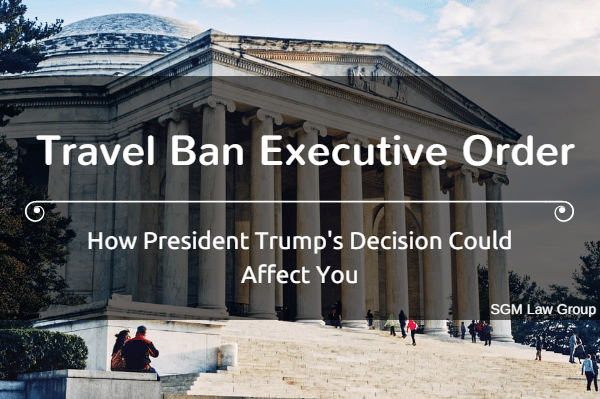
On January 27th, 2017, President Donald Trump signed a travel ban executive order into effect that puts a hold on the U.S. Refugee Admissions Program for 120 days and prevents refugees from seven distinct nations from entering the U.S. for 90 days.
Due to suspected threat of attack from the nationals of these countries, citizens of the following nations will not be able to enter the U.S. under immigrant or nonimmigrant status for the 90 days following the signing of the order:
- Libya
- Iraq
- Somalia
- Sudan
- Iran
- Yemen
- Syria – refugees from this country have been banned until further notice.
In addition, the President is also temporarily suspending the admission of worldwide refugees for 120 days. Certain refugees may be allowed in at the government’s discretion on a case-by-case basis. To learn more about the U.S. policy concerning refugees, take a look at the Geneva Refugee Convention of 1951.
This executive order also provides for a more stringent policy regarding the immigration process. The President has called for the Secretary of State, Secretary of Homeland Security, Director of Intelligence, and the Director of the Federal Bureau of Investigation to develop a program that will make the immigration process more selective.
To read the unbiased exact text of the Travel Ban Executive Order, you can visit the White House website.
How This May Affect You
When researching this issue, it is important to read the primary text thoroughly and discuss it with your immigration attorney before coming to conclusions about how this will affect you.
If you are a citizen of the above-mentioned nations and wish to come to the U.S., you will not be able to enter the country until the temporary ban has been lifted. As of the time of writing this post, it is unclear if the ban will be extended or if other countries will be added to the list in the future. We will keep you apprised of any such changes.
If you are a green card holder from one of the listed countries who is currently in the U.S., then leaving the country will most likely subject you to the ban. However, while it is possible to secure a national interest waiver on a case-by-case basis, it is advisable to remain in the U.S. until the ban has been lifted or the conditions have changed to allow you to leave.
If you are from Syria, you will not be permitted to enter the country under refugee status until the President makes certain changes in the Refugee Program.
If you are not from the above-listed countries and you are a refugee, you may still be able to enter the U.S. depending on how the Secretary of State and the Secretary of Homeland Security judge your individual case.
If you are not from the listed countries, then as of the time of writing this post, you will still be permitted to enter and exit the U.S. However, the visa issuance policies may undergo radical changes:
- The Visa Interview Waiver Program has been suspended. This means that all able nonimmigrant visa applicants will be subjected to an interview with an immigration officer.
- The Secretary of State now has the power to adjust the parameters of nonimmigrant visas according to the parameters provided to U.S. citizens in the reciprocal country. For example, if U.S. citizens find that their visa validity periods have been shortened or the fees have been increased in Costa Rica, the United States will, therefore, do the same for Costa Ricans entering the U.S. under nonimmigrant status.
- The Executive Order also includes a broad overview of an upcoming program that will make the immigrant screening process more selective. This includes, but is not limited to, in-person interviews, measures to prevent fraudulent or duplicate documents, amended application forms, as well as mechanisms to ensure that the individual will be a positive contributor to society rather than a detrimental one.
Travel Ban Conclusion
Many people are fearful for their immigrant or nonimmigrant status in the U.S. as a result of this travel ban. Rest assured that, for the time being, this executive order only affects those who are outside of the U.S. If you are from one of the listed countries, it is advisable to remain in the U.S. for the present. If you are not from one of the listed countries, then this order should not be the cause of fear for your personal status.
With these changes in mind, it is all the more important to work with your immigration attorney to learn exactly how these new developments affect your specific situation. Whether you are a current resident of the nations mentioned in the travel ban or a nonimmigrant from a different country that wishes to work in the U.S., seeking the counsel of a qualified lawyer can help clarify any issues concerning immigration law.
To schedule a consultation with one of our attorneys, you can fill out this contact form to have all of your immigration questions answered and your fears put to rest.
 Shilpa Malik
Shilpa Malik  Sabrina Saada
Sabrina Saada